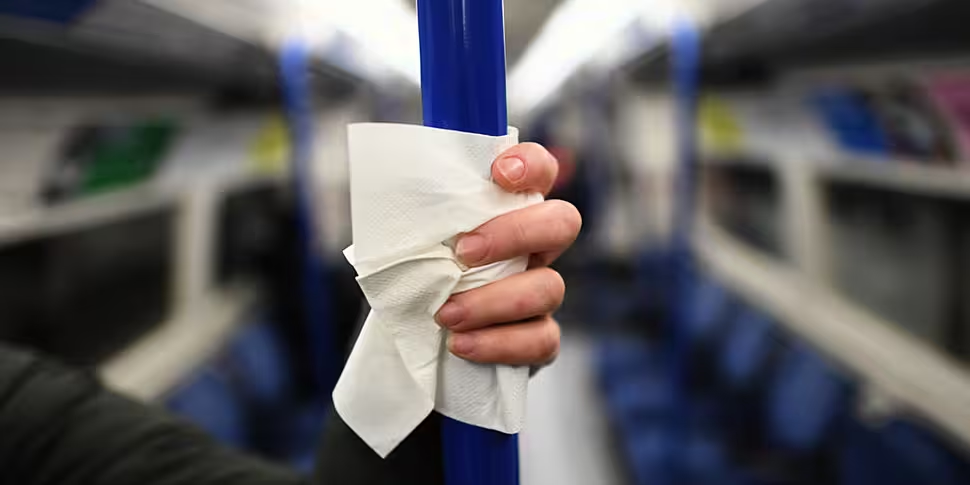This article looks at COVID-19, what it is, its symptoms and how to prevent it.
It is a new illness that can affect people's lungs and airways, and is caused by a virus called coronavirus.
It can take up to 14 days for symptoms to appear.
This means people could have the virus, but not be aware of it.
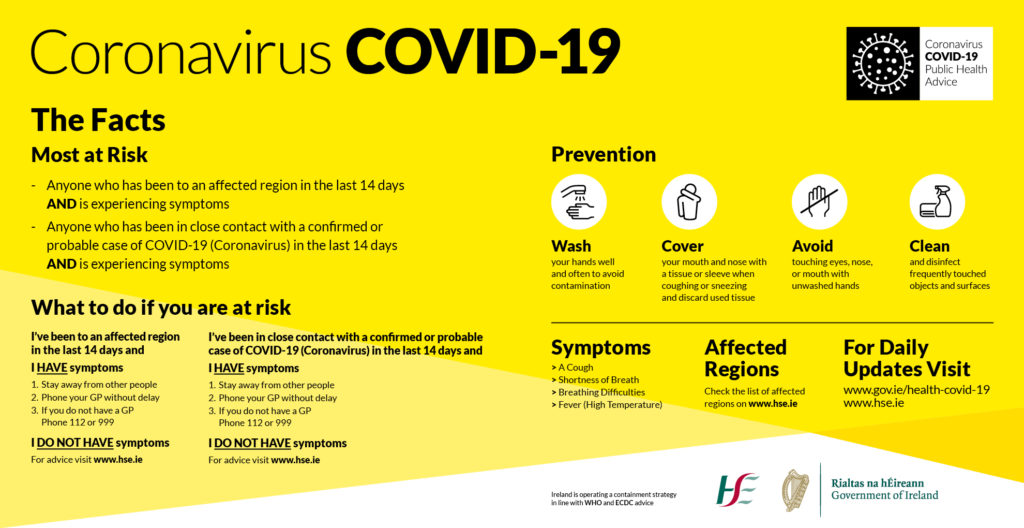 Source: Department of Health
Source: Department of HealthThe most common symptoms of coronavirus are:
- A cough - this can be any kind of cough, not just dry
- Shortness of breath
- Breathing difficulties
- Fever (high temperature)
But there are differences between the coronavirus and the standard flu.
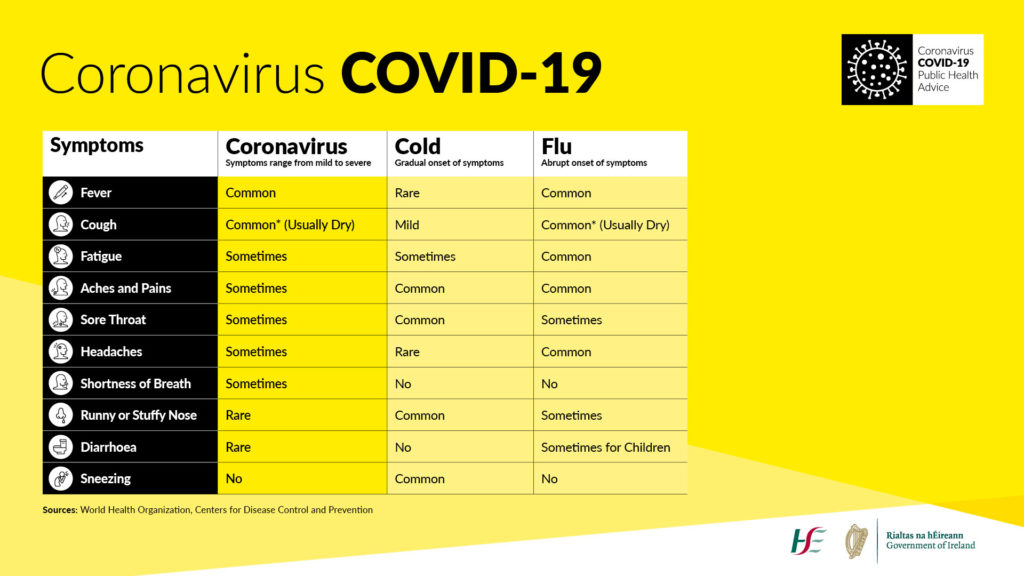 Source: Department of Health
Source: Department of HealthHow coronavirus is spread
Coronavirus is spread in sneeze or cough droplets.
You could get the virus if you:
- Come into close contact with someone who has the virus and is coughing or sneezing
- Touch surfaces that someone who has the virus has coughed or sneezed on
As it's a new illness, it is not known how easily the virus spreads from person to person. Spread is most likely from those who have symptoms.
The virus may only survive a few hours if someone who has it coughs or sneezes on a surface.
Simple household disinfectants can kill the virus on surfaces. Clean the surface first and then use a disinfectant.
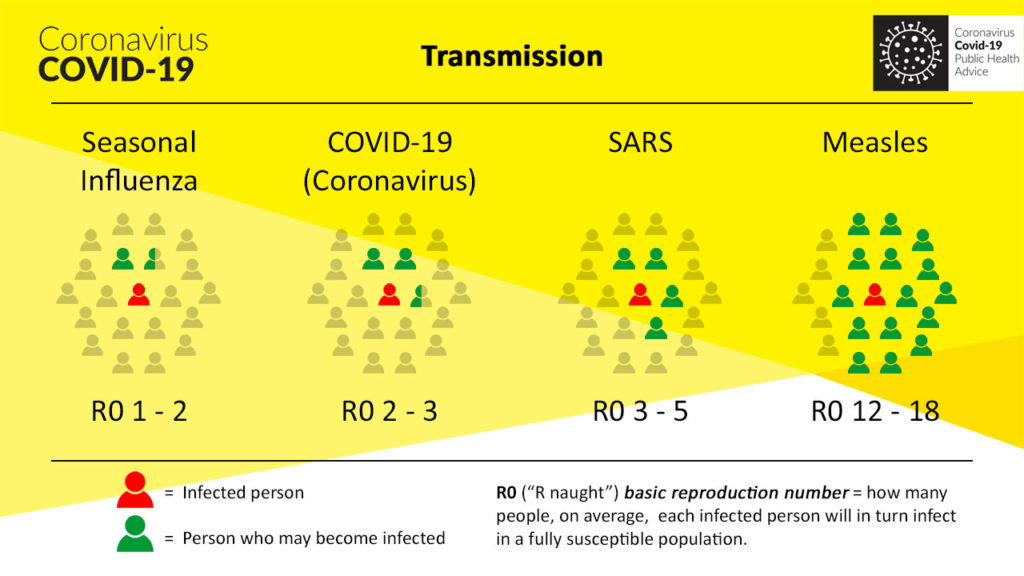 Source: Department of Health
Source: Department of HealthWho is at risk
Illness due to COVID-19 infection is generally mild, especially for children and young adults.
However, it can cause serious illness: about one in every five people who catch it need hospital care. according to the World Health Organisation (WHO).
What to do
People who believe they may have these symptoms should not go to a hospital or GP.
They should phone a doctor if they have symptoms and any of the following:
- They are the type of symptoms you would usually contact a GP about
- They have travelled from an affected area
- They are a close contact of a confirmed case in Ireland - if they are, the Department of Public Health will contact them
Close contact can mean:
- Spending more than 15 minutes face-to-face contact within two metres of an infected person
- Living in the same house or shared accommodation as an infected person
Anyone with symptoms of coronavirus who has been in close contact with a confirmed case in the last 14 days should:
- Isolate themselves from other people - this means going into a different, well-ventilated room alone with a phone
- Phone their GP, or emergency department
- In a medical emergency (if you have severe symptoms) phone 112 or 999
The most effective ways to protect yourself and others against COVID-19 are to frequently clean your hands, cover your cough with the bend of elbow or tissue and maintain a distance of at least three feet from people who are coughing or sneezing.
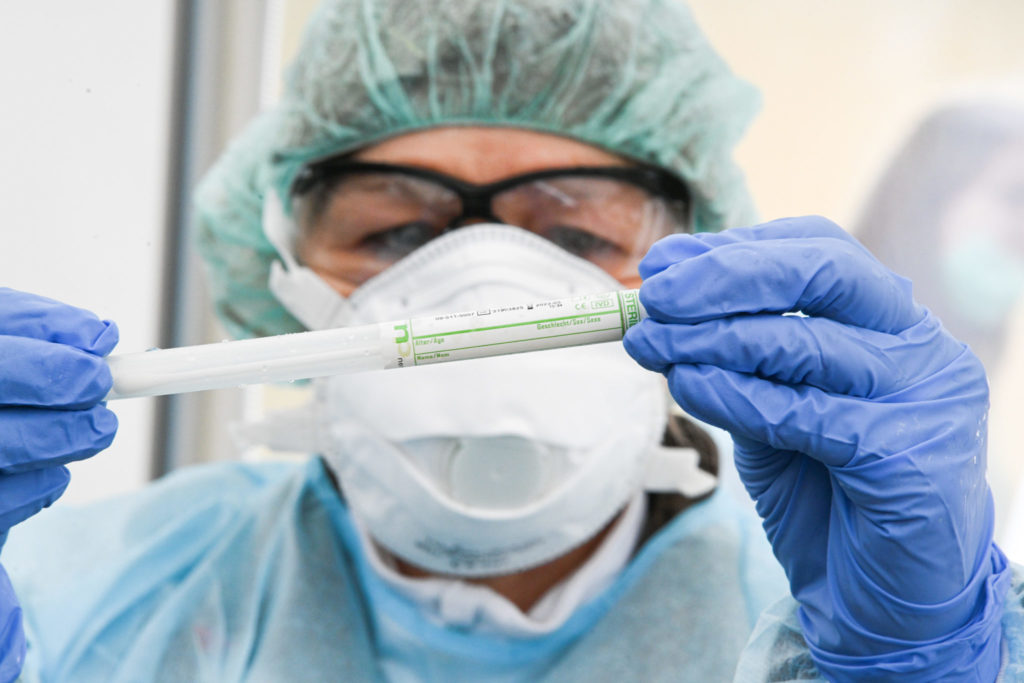 A doctor holds a swab in a plastic tube in her hands after taking a smear from a patient's throat under a tent at a test centre in Germany | Image: Felix K?stle/DPA/PA Images
A doctor holds a swab in a plastic tube in her hands after taking a smear from a patient's throat under a tent at a test centre in Germany | Image: Felix K?stle/DPA/PA ImagesShould I wear a mask
The WHO says only people who you are ill with COVID-19 symptoms (especially coughing) or looking after someone who may have the virus should wear a mask.
Disposable face masks can only be used once.
The WHO says if you are not ill or looking after someone who is ill "then you are wasting a mask."
There is a world-wide shortage of masks, so it is urging people to use masks wisely.
It advises "rational use" of medical masks to avoid unnecessary wastage.
Washing hands
Having clean hands is the best way to stop the spread of harmful germs.
People should use soap and water or alcohol hand rub to clean their hands regularly.
- Wet your hands with warm water and apply soap
- Rub your hands together until the soap forms a lather
- Rub the top of your hands, between your fingers and under your fingernails
- Do this for about 15 seconds
- Rinse your hands under running water
- Dry your hands with a clean towel or paper towel
Testing for coronavirus
You will need to be tested for coronavirus if you have symptoms and have in the last 14 days been:
- In close contact with a confirmed case of coronavirus
- To a place where there is spread of coronavirus
Your doctor may also suggest you are tested for coronavirus if you have a severe lung infection.
If your doctor thinks that you need a test for coronavirus, they will tell you where the test will be done. They will also tell you when to expect your results.
International post
You cannot get coronavirus from packages or food that has come from China or elsewhere.
There is also no evidence that animals or animal products legally imported into the EU are a health risk due to coronavirus.
Is there a treatment
There is no specific treatment for coronavirus - but many of the symptoms of the virus can be treated.
Supportive treatments, like oxygen therapy, can be given while your own body fights the virus.
Life support can be used in extreme cases.
If you get the virus, your healthcare professional will advise treatment based on your symptoms.
Antibiotics do not work against coronavirus or any viruses. They only work against bacterial infections.
There is currently no vaccine to treat or protect against coronavirus.
The flu vaccine does not protect against it.


